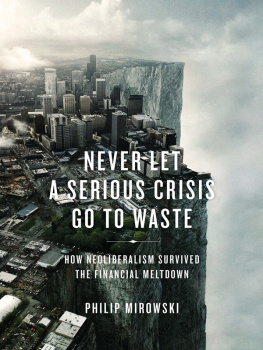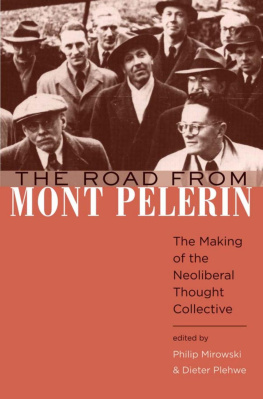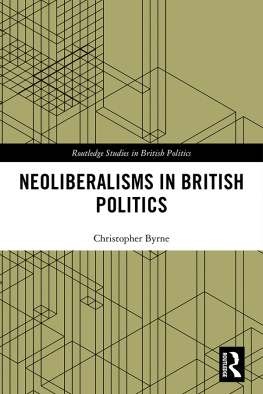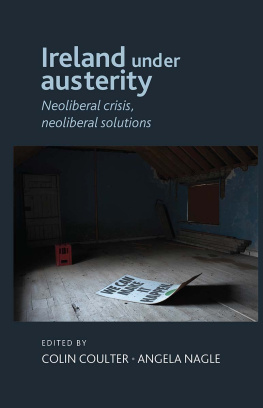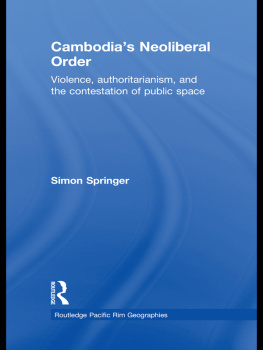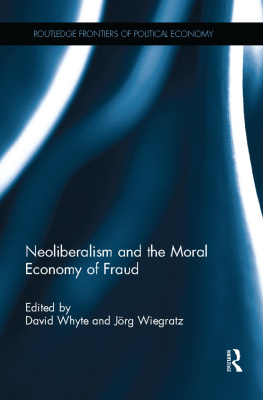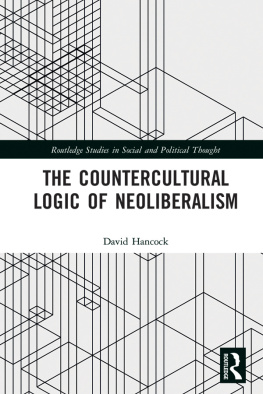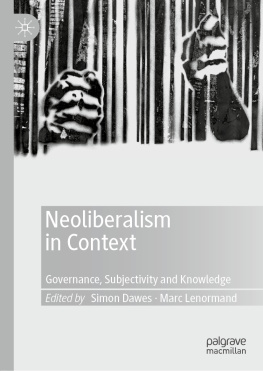
Never Let a Serious Crisis
Go to Waste
How Neoliberalism Survived
the Financial Meltdown
Philip Mirowski

First published by Verso 2013
Philip Mirowski 2013
All rights reserved
The moral rights of the author have been asserted
Verso
UK: 6 Meard Street, London W1F 0EG
US: 20 Jay Street, Suite 1010, Brooklyn, NY 11201
www.versobooks.com
Verso is the imprint of New Left Books
ISBN: 978-1-781-68393-3 (e-book)
British Library Cataloguing in Publication Data
A catalogue record for this book is available from the British Library
Library of Congress Cataloging-in-Publication Data
Mirowski, Philip, 1951
Never let a serious crisis go to waste : how
neoliberalism survived the financial meltdown / Philip
Mirowski.
pages cm
Includes bibliographical references and index.
ISBN 978-1-781-68079-7 (pbk. : alk. paper)
1. Neoliberalism. 2. Economic policy. 3. Financial
crises. 4. Global Financial Crisis, 20082009.
5. United States Economic policy 2009 I. Title.
HB95.M57 2013
320.513 dc23
2013013476
Typeset in Bembo by Hewer Text UK Ltd, Edinburgh
Printed in the US by Maple Vail
To neoliberals of all parties
Contents
4.1 Average profit per employee, United States
5.1 Economist salary differentials, by academic sector
1.1 Hilarity at the Federal Reserve
2.1 Growth of MPS-affiliated think tanks
2.2 MPS founding meeting, national representation
2.3 MPS 1991 membership, national representation
2.4 Mentions of Friedrich Hayek in various English-language sources
4.1 Corporate profits/U.S. GDP
4.2 Index of world equity prices, Great Depression and current crisis
4.3 Index volume of world trade, Great Depression and current crisis
4.4 Google Trends search term: toxic assets
4.5 Fed projection misses the mark
4.6 American bank mergers, 19952009
4.7 The Flash Crash of May 6, 2010
5.1 Proportions of U.S. mortgages originated by various financial entities, 19532007
6.1 European ETS prices, 2011
6.2 European public and private debt, 2000 and 2010
6.3 U.S. public and private debt, 19202011
6.4 Total Over-the-Counter Outstanding Derivatives
6.5 Google Trends for search term financial innovation
Conjure, if you will, a primal sequence encountered in B-grade horror films, where the celluloid protagonist suffers a terrifying encounter with doom, yet on the cusp of disaster abruptly wakes to a different world, which initially seems normal, but eventually is revealed to be a second nightmare more ghastly than the first. Something like that has become manifest in real life since the onset of the crisis which started in 2007. From the crash onward, it was bad enough to endure house prices sinking under water, dangling defaults and foreclosures, the collapse of what remained of manufacturing employment, the reduction of whole neighborhoods to bombed-out shells, the evaporation of pensions and savings accounts, the dismay of witnessing the hope of a better life for our children shrivel up, neighbors stocking up on firearms and people confusing bankruptcy with the Rapture. It was an unnerving interlude, with Nietzschean Eternal Return reduced to an Excel graph with statistics from the Great Depression of the 1930s.
Fast forward to 2011. Whether it was true or not, people had just begun to hope that things were finally turning around. Moreover, journalists in mainstream publications bandied about the notion that academic economics had failed, and hinted that our best minds were poised to rethink the doctrines that had led the world astray. Yet, as the year grew to a close, it slowly dawned upon most of us that the natural presumption that we were capable of rousting ourselves from the gasping nightmare, that we might proceed to learn from the mistakes and fallacies of the era of Neoliberal Follies, was itself just one more insidious hallucination. A dark slumber cloaked the land. Not only had the sense of crisis passed without any serious attempts to rectify the flaws that had nearly caused the economy to grind to a halt, but unaccountably, the political right had emerged from the tumult stronger, unapologetic, and even less restrained in its rapacity and credulity than prior to the crash.
In 2010, we were ushered into a grim era of confusion and perplexity on the left. It took a rare degree of self-confidence or fortitude not to gasp dumbfounded at the roaring resurgence of the right so soon after the most dramatic catastrophic global economic collapse after the Great Depression of the 1930s. Incongruity seems too polite a term to describe the unfolding of events; contradiction seems too outmoded. Austerity became the watchword in almost every country; governments everywhere became the scapegoats for dissatisfaction of every stripe, including that provoked by austerity. In the name of probity, the working class was attacked from all sides, even by nominal socialist parties. In the few instances when class mobilization was attempted by trade unions to counterattack, as in the recall petition for Scott Walker in the state of Wisconsin, the birthplace of American progressivism, it failed. The pervasive dominance of neoliberal doctrines and right-wing parties worldwide from Europe to North America to Asia has flummoxed left parties that, just a few short years ago, had been confident they had been finally making headway after decades of neoliberal encroachment. Brazenly, in many cases parties on the left were unceremoniously voted out because they had struggled to contain the worst fallout from the crisis. By contrast, the financial institutions that had precipitated the crisis and had been rescued by governmental action were doing just finenay, prospering at precrisis ratesand in a bald display of uninflected ingratitude, were intently bankrolling the resurgent right. Indeed, the astounding recovery of corporate profits practically guaranteed the luxuriant postcrisis exfoliation of Think Tank Pontification. Nationalist proto-fascist movements sprouted in the most unlikely places, and propounded arguments bereft of a scintilla of sense. Nightmare did not register as hyperbolic; it was the banjax of the vanities.
The Winter of Our Disconnect
I remember when I first felt that chill shiver of recognition that the aftermath of the crisis might be suspended in a fugue state far worse than the somnolent contraction itself. I was attending the second meeting of the Institute for New Economic Thinking (INET) at Bretton Woods in New Hampshire in April 2011. There probably would have been better places to take the temperature of the postcrisis Zeitgeist and observe the praxis of the political economy than up in the White Mountains, but I had been fascinated by the peccadilloes of the economics profession for too long, and anyway had felt that the first INET meeting at Cambridge University in 2010 bore some small promisefor instance, when protestors disrupted the IMF platitudes of Dominique Strauss-Kahn in Kings great hall, or when Lord Adair Turner bravely suggested we needed a much smaller financial sector. But the sequel turned out to be a profoundly more unnerving and chilly affair, and not just due to the caliginous climate. The nightmare scenario began with a parade of figures whom one could not in good conscience admit to anyones definition of New Economic Thinking: Ken Rogoff, Larry Summers, Barry Eichengreen, Niall Ferguson, and Gordon Brown. Adair Turner was summoned for a curtain call, reprising his previous years performance, but offered only tired bromides on happiness studies and rationality. The range of economic positions proved much less varied than at the first meeting, and one couldnt help notice that the agenda seemed more pitched toward capturing the attention of journalists and bloggers, and those more interested in getting to see some star power up close than sampling complex thinking outside the box. It bespoke an unhealthy obsession with Guaranteed Legitimacy and Righteous Sound Thinking. But, eventually, even the journalists and the bloggers sensed the chill in the proceedings. Here were a few contemporary responses:
Next page
